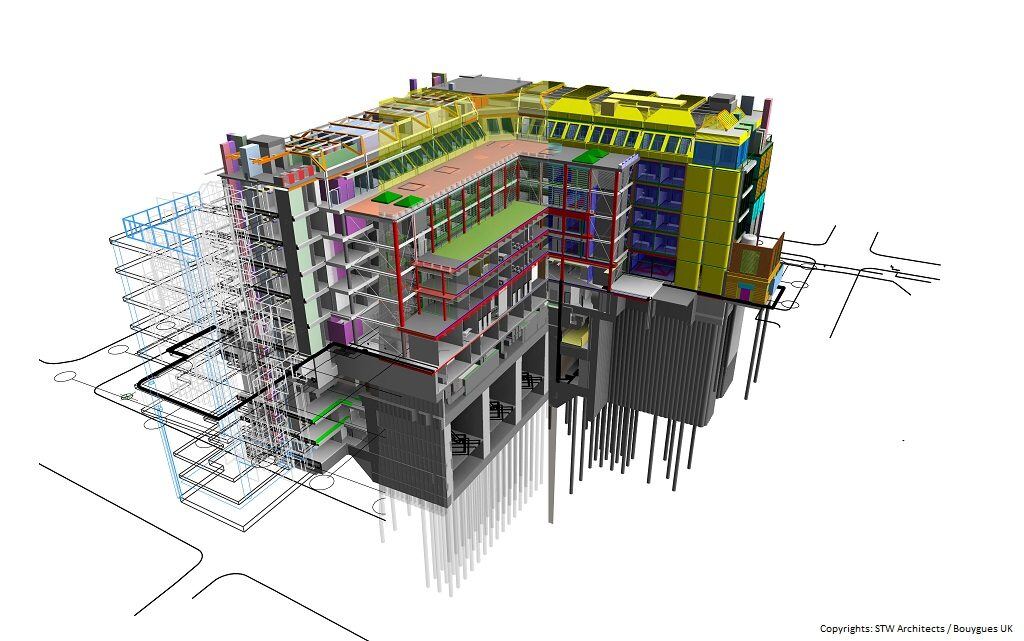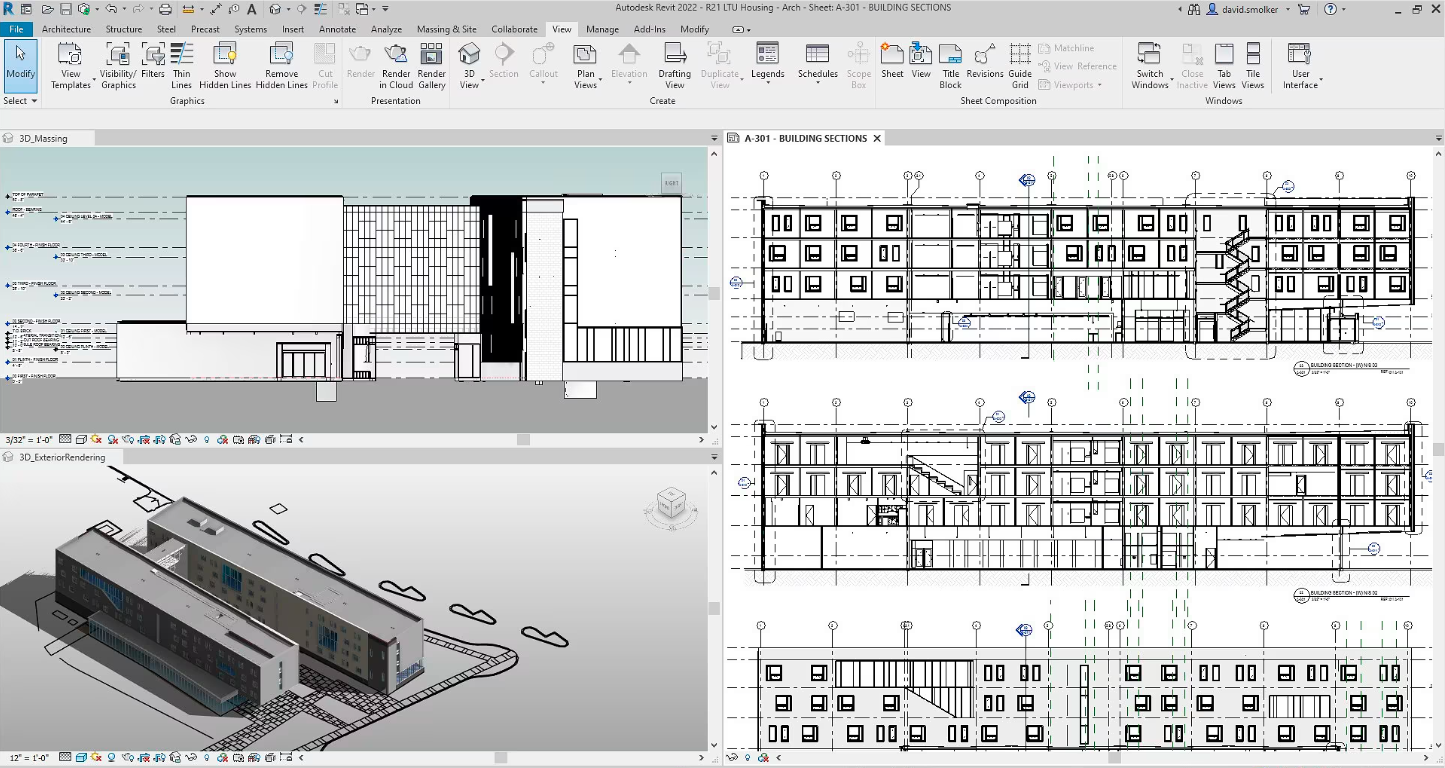Top 5 BIM Architecture Courses in India: Significance & Benefits (2026)

Table of Contents
Architects in India hold a pivotal role in shaping the nation’s infrastructure, blending aesthetics with technical advances to create iconic structures that define our surroundings. With that, keeping up with the fast-paced and constantly evolving Architecture, Engineering and Construction (AEC) industry requires continuous upskilling. Constant learning and development are important for architects as they equip professionals with the tools and knowledge needed to effectively tackle unconventional design challenges through streamlined processes.
BIM (Building Information Modelling) enables architects to take a comprehensive approach to design and manage projects, improving collaboration and efficiency among multidisciplinary teams. Architects proficient in BIM can navigate complex projects with ease, leading to higher productivity and client satisfaction. Moreover, BIM proficiency is essential to remain future-ready in an industry increasingly focused on digitisation and sustainability. Architects skilled in BIM can integrate sustainable practices into their designs, meet global standards, and deliver innovative solutions that resonate with modern trends and requirements.
By prioritising upskilling, particularly in BIM, architects in India can unlock new opportunities, improve career prospects, and contribute significantly to the ongoing transformation of the AEC industry.
Why Should you Learn Additional Courses Related to Architecture?

Architecture is an ever-growing field that requires you to keep updating your knowledge. Upskilling through additional courses related to architecture increases awareness and offers numerous benefits that can improve your career, competency, and skill set. Here are some compelling reasons to consider:
1. Career Advancement
Acquiring additional courses in architecture opens up new opportunities and enables you to specialise in specific areas, such as BIM modelling, sustainable design, heritage preservation, and interior design. This specialisation not only makes you more appealing to potential employers and clients but also positions you as a valuable asset in the industry, capable of tackling complex projects with expertise and innovation.
2. Competitive Edge
Having diverse skills and knowledge sets you apart from your peers. It demonstrates your commitment towards continuous learning and growth, improving your professional reputation. It allows you to adapt to different design challenges, either through mastering new design software or excelling in project management and enables you to solve problems through innovative solutions. It is a strategic investment that yields both immediate and long-lasting benefits.
Also Check out: How BIM Benefits Small Firms and Independent Consultants?
3. Adaptability
The architecture industry is constantly evolving with technical advancements, sustainable practices, and changing client demands. Learning additional courses helps you stay updated with the latest trends and techniques, enhancing your adaptability in the ever-changing landscape.
4. Networking Opportunities
Enrolling in courses often involves interacting with industry professionals, fellow architects, and experts in specialised fields. This networking provides valuable connections, collaborations, and mentorship opportunities that can further accelerate your career growth.
5. Professional Development
Continuous learning and upskilling contribute to overall professional development. They encourage a mindset of lifelong learning, creativity, innovation, and critical thinking, essential qualities for success in any industry.
Benefits of BIM for Architects

1. Improved Communication
BIM enhances communication with clients, stakeholders, and regulatory authorities by visualising design concepts in a manner that all parties understand. Virtual walkthroughs, renderings, and animations generated from BIM models help stakeholders visualise the final project, leading to better communication and stakeholder buy-in.
2. Effective Collaboration
BIM provides effective collaboration among multidisciplinary teams involved in AEC projects, ensuring seamless access and contribution to a shared building information model. This streamlined coordination minimises misunderstandings and data loss, leading to improved client-facing presentations and swift responses to inquiries regarding cost, schedule, and design modifications.
3. Career Development
With BIM becoming the standard technology in the global AEC industry, there is a growing demand for skilled architects proficient in BIM tools. This demand opens up ample career opportunities for architects, enabling them to progress more seamlessly in their career paths.
4. Cost Efficiency and Time Savings
BIM contributes to cost-effective project management by improving collaboration and eliminating redundant processes. Studies show that using BIM for clash detection can save up to 20% of project costs, particularly in design-bid-build projects, by addressing conflicts and details like materials and dimensions upfront.
5. Improved Customer Satisfaction
BIM empowers architects to visually showcase various design options and instantaneously implement client-requested changes. This real-time visualisation and modification capability leads to a better understanding and fulfilment of client needs, ultimately resulting in higher levels of customer satisfaction.
6. Risk Mitigation for Cost Management
BIM strengthens collaboration between architects and construction firms, allowing for rapid adjustments to initial designs at minimal cost. This capability mitigates the risk of cost overruns due to design changes, ensuring better cost management and project profitability.
Top 5 Online BIM Courses Related to Architecture
1. BIM Professional Course for Architects V2.0 by Novatr
Mode of Study: Online
Fee: INR 195,000
Duration: Nine months
Certification: Yes (triple)
Placement Asssitance: Yes
Course Curriculum:
- Introduction to the fundamentals of BIM: Overview
- Basics of BIM modelling
- Advanced BIM modelling
- Modelling parametric structure families
- 3D visualisation
- 4D and 5D BIM modelling
- Documentation and presentation
- BIM processes and workflows
- BIM for infrastructure and management
- BIM coordination using Navisworks
- Clash detection and coordination
- Team Collaboration
- Multidisciplinary workflow
- RIBA-structured capstone project
- Careers in BIM
Key Features:
The reimagined BIM architecture course offered by Novatr empowers participants with the skills needed to carve a unique path to success. It caters specifically to the architects' needs and offers a comprehensive program with essential knowledge and software skills crucial for BIM. Whether you’re a recent graduate or a professional, this course teaches you the application of BIM concepts through hands-on training and real-world projects. Under the guidance of industry experts, this course provides training in more than 15 BIM tools, allowing participants the chance to apply their knowledge in a RIBA capstone project. Additionally, participants receive invaluable placement support, making Novatr’s course a go-to choice for architects looking to excel in their careers.
Also Check out: 6 Best BIM Courses With Placements
2. Architectural BIM Modelling by CADBIM Centre
Mode of Study: Online
Fee: Information is available upon enquiry
Duration: 100 hours
Certification: Yes
Placement Asssitance: Yes
Course Curriculum:
- BIM modelling and 3D rendering
- 4D simulation
- Walkthroughs for visualisation
- BIM workflow and LOD (Level of Development) concepts
- Bill of quantities (BOQ)
- Conceptual and site details
- Site plan development
- Landscape detailing
- Authority approval drawings
- Detailing and documentation
- Parametric family creation
- Mini project management
- National and international building codes and standards
- GIS (Geographic Information System) and urban planning
- Navisworks and clash coordination
Key Features:
The Architectural BIM Modelling course offered by CADBIM focuses on training participants to create and develop buildings using advanced BIM tools. The course provides project-oriented training in site and conceptual BIM modelling. Participants learn about different levels of development and clash coordination within the model. The course is designed to meet current market requirements and covers BIM software like Navisworks, Recap, Dynamo, 3Ds Max, and V-Ray. Specific attention is given to point cloud integration enhancing skills and job readiness. Upon completion, participants gain the knowledge and confidence to apply for various roles, translating their expertise into practical applications valued by the industry.
This course is ideal for participants seeking exposure to global projects and promising career opportunities. With a curriculum approved by leading universities, participants benefit from lifelong technical support, ensuring a comprehensive learning experience.
3. Autodesk BIM for Architecture Design Development by Additional Skill Acquisition Programme (ASAP)
Mode of Study: Online
Fee: INR 7670. Additional INR 5000 plus GST is applicable for graduated candidates
Duration: 45 hours
Certification: Yes
Placement Asssitance: Yes
Course Curriculum:
- Fundamentals of BIM and related definitions
- Conceptualisation with Autodesk
- 3D modelling and visualisation
- Architectural modelling with Autodesk Revit
- FORMIT 360
- Construction details and documentation
Key Features:
Autodesk’s BIM software is widely used in architecture and construction industries for its ability to digitally prototype projects. It helps BIM professionals plan, design, construct and manage infrastructure efficiently.
This course covers everything about BIM with Autodesk's world-class BIM solutions, from basic concepts to practical applications. The topics covered include BIM modelling techniques, clash detection, 4D simulation, collaboration tools, and project management. Participants engage in hands-on projects to reinforce their learning and develop proficiency in using BIM tools. After completing the course, participants are equipped with skills needed for roles like BIM modeller, BIM coordinator, or BIM consultant in architectural firms. The course also offers ongoing support and access to resources such as online forums, tutorials, and updates to keep participants up-to-date with industry trends and software advancements.
Also Checkout: 10 High-Paying Architecture Jobs You Can Get by Upskilling
4. Advanced Revit & BIM Certification Course by Kaarwan
Mode of Study: Online
Fee: Information is available upon enquiry
Duration: One-two month
Certification: Yes
Placement Assistance: Yes
Course Curriculum:
- Revit and BIM basics
- Massing, 3D architectural and structural modelling
- 6D simulations in BIM
- Visualisation and walkthroughs
- Site topography, solar study, scheduling and cost estimation
- Facade, adaptive families, custom families
- Analytical model & energy optimisation
- MEP & fire safety
- CDE & Project Management
- Point Cloud, BIM 360, Navisworks, Lumion
Key Features:
This BIM course offers a well-rounded combination of theoretical insights and hands-on exercises specifically tailored to real-world industry projects. Led by seasoned professionals, it aims to impart skills in the foundational aspects of the BIM ecosystem, 3D modelling, rendering, and 6D simulations. It teaches more than six BIM tools for detailed development and training along with Navisworks and advanced rendering tools like Lumion to gain expertise in clash detection and structural robustness. To further implement their learnings, the participants are encouraged to work on a RIBA-certified project. Throughout the duration, participants are mentored to build a comprehensive Revit and BIM portfolio, positioning them for lucrative career opportunities. Additionally, the course lends complete placement support until participants land a secure job in the AEC industry.
5. BIM Course by Capricot
Mode of Study: Online
Fee: Information is available upon enquiry
Duration: Not defined
Certification: Yes
Placement Assistance: Yes
Course Curriculum:
- Fundamentals of BIM
- Conceptual design
- Sustainable design
- Construction and documentation
- Design development
Key Features
This BIM course provides extensive training on the fundamentals and workflows of BIM, prioritising holistic understanding over mere tool proficiency. The course features interactive learning sessions where a dedicated support team is available to address queries, provide relevant data, and ensure a smooth learning experience. Upon completing the course, participants receive a certificate solidifying their expertise in BIM.
Conclusion
The AEC industry is evolving significantly with the widespread adoption of BIM, marking a substantial shift rather than a passing trend. This curated list of the top 5 BIM courses related to architecture is created to equip individuals with the skills and knowledge to improve employability and the ability to design sustainable and innovative structures effectively.
Among these courses, Novatr stands out with its industry-leading BIM Professional Course for Architects V2.0. This course provides access to insights from global industry experts affiliated with top architectural firms. Check out the course and enrol today.
For more details about BIM, its importance and career options, head to our Resources Page.

 Thanks for connecting!
Thanks for connecting!
.jpg)

.png)






